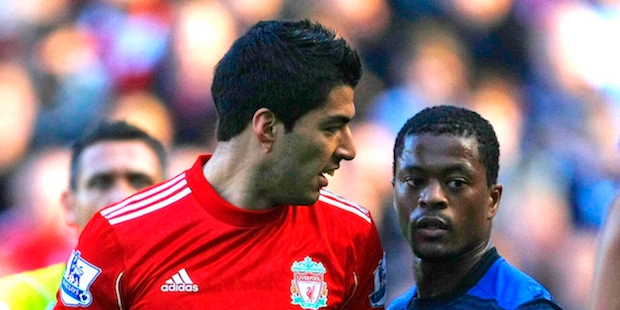One of football’s many beauties is in encouraging us to forsake unfortunate strictures of accepted behaviour; as long as it’s at the game, we can sing, swear, cuddle strangers, and even care about stuff without fear of ridicule. And, perhaps best of all, we’re entitled to rejoice in the dastardly; it’s entirely justifiable to drool over the respective oeuvres of Roy Keane, Thierry Henry and Sergio Busquets, if they so tickle you.
The game can also serve as a masking agent for off-pitch indiscretions, and remind people that personal matters are precisely that. Kenny Dalglish somehow wore links to the Clerkenwell crime syndicate, and though plenty of people dislike Wayne Rooney, it’s generally not on account of his nocturnal activities.
But every now and again there arrives an individual who forces engagement with regular sensibilities; consider Luis Suárez. While the biting, diving and complaining – and consequent indignation – can be considered part of football’s joy, the racial abuse of Patrice Evra remains extraneous to it. To recap, Suárez first admitted, then justified the offence, and most recently, allocated chunks of blame to every resident of England – when all he had to do was apologise.
And there has been significant collateral damage. He exposed his club and many of its supporters as blinkered at best, institutional racists at worst, while Arsène Wenger, whom it might have been supposed understood some things to be more important than winning, also made clear to the contrary. Then, a few months ago, Suárez was presented with the Football Supporters’ Federation a player of the year award, a single gesture that could have alienated its entire constituency – yet, at the same ceremony, journalists and celebrants frottaged over how charitably he accepted their adulation.
But given that Suárez is, indisputably, the country’s best player, maybe it makes little sense to ignore him on ethical grounds – rather, so to do would be intellectually dishonest. And this is likely the sole element considered by Evra, who voted for him as this season’s PFA Players’ Player of the Year.
There is a more obvious case for his omission as regards the football writers’ award – its originator, Charles Buchan, suggested it be presented ‘to the professional player who by precept and example is considered by a ballot of members to be the footballer of the year.’ But otherwise, the award is either presented to the most deserving case, or not.
In which case, the key question asks whether it is morally legitimate to glorify the work of the morally illegitimate. This is a debate that has long been settled as regards culture, which fought at length to exclude all moral dimensions and impositions from its assessment, art separated from artist. As such, the genius of a sex abuser like Roman Polanski, and even of antisemites such as Roald Dahl, T.S. Eliot, and Richard Wagner, whose bigotry informs their work, can be enjoyed for its own value and sake – and ours too.
This is so, not because of any rejection of morality, but because morality isn’t what art does. We rely on it to tell us about our world, which it often does by exploring moral issues, or through a moral sentiment or dimension – but to do so honestly and with integrity, it must be unbound by strictures directing it towards a particular opinion, perspective or conclusion. For the same reason, when Maria Miller asserted that “our focus must be on culture’s economic impact,” she unwittingly revealed a total lack of suitability for her job at DCMS.
Accordingly, if football can be categorised as art, then the various bodies keen to honour Suárez might be ok – and it is certainly possible. We are encouraged to conceive of the world differently, experience a sweeping narrative, and the manner of performance – particularly that of Suárez – displays a particular attitude towards life. In both deed and demeanour, he provokes us to feel things, appreciate space differently, and, most importantly of all, is aesthetically engaging and demanding.
This is also handy for those who prefer talking in words to talking in numbers; there’d not be much point discussing Picasso’s painting completion stats, or plotting Lord Olivier’s average position. And, in the case of Suárez, perhaps we are obligated to applaud him, exalting him in song no different to humming along with the Oompa Loompas, Jellicle Cats and Tristan und Isolde, or rationalising the world by reference to Chinatown.
Yet, there remains something distasteful about Luis Suárez being named player of the year, particularly in a game and a country that, however much it might like to think otherwise, has far from triumphed over racism. Football’s curiously hypocritical, parochial morality is part of its charm, but Liverpool fans lauding Suárez as some kind of saviour-martyr, whilst haranguing Evra for being abused by him in the pursuit of a competitive advantage, is extraneous to that.
Though rewarding Suárez’s footballing prowess is intellectually and morally justifiable, it need not override more profound feelings of right and wrong. Racism is the most appalling blight on our planet, and our duty as human beings is never to override instances of it. Rehabilitation and redemption is achieved, not by becoming even better at football, but through repentance.
Daniel Harris is a writer, mainly for the Guardian. His most recent book,The Promised Land, tells the story of Manchester United’s treble season






Comments